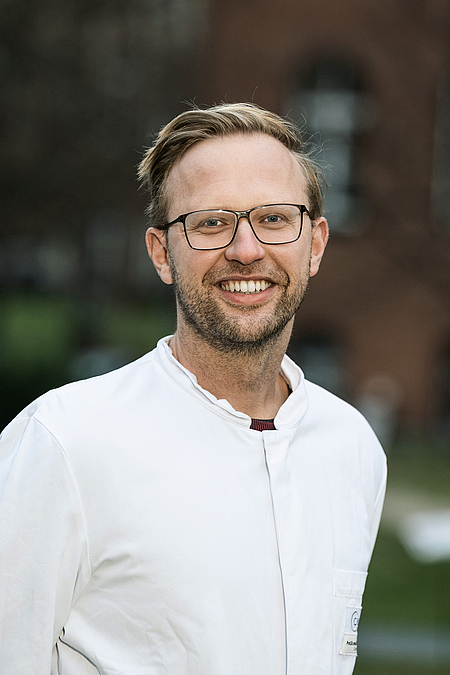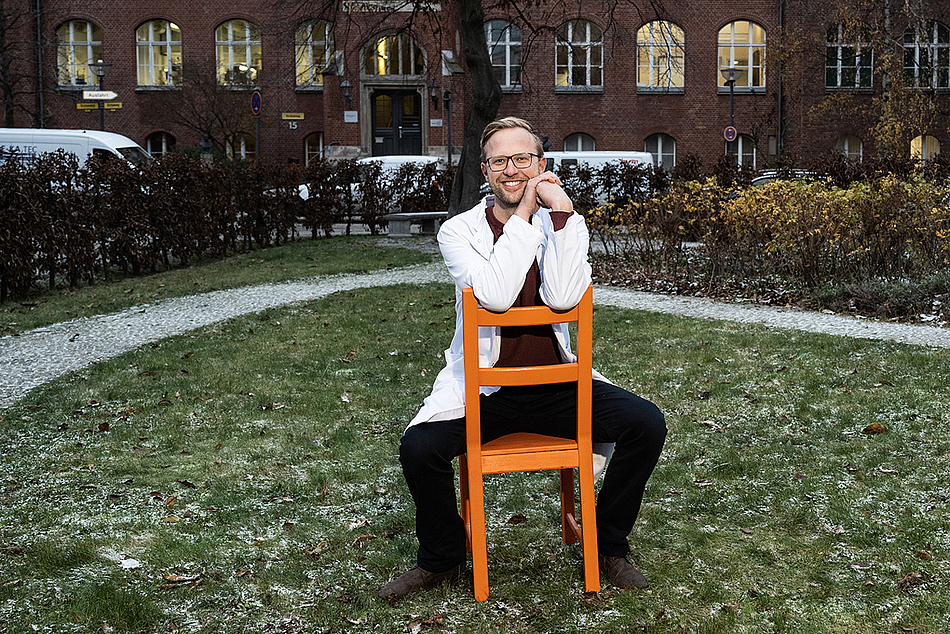About finding better treatment for depression and the unpredictability of the day-to-day in a psychiatric clinic
Prof. Dr. Stephan Köhler completed his medical studies at the Charité – Universitätsmedizin Berlin and still works here today. As Deputy Medical Director at the Clinic for Psychiatry and Psychotherapy at Campus Mitte, he specifically works with therapy-resistant as well as chronic depression. For his clinical-scientific work he is funded as a BIH Clinical Fellow by Stiftung Charité. But what led Mr. Köhler to research depression? What does daily life at a psychiatric clinic actually look like? And what did the funding enable our Clinical Fellow to do? We met him on site for an interview.
Prof. Köhler, your project aims to develop a prediction tool for clinical work and teaching that optimizes therapy options for depressive illnesses. Why is there a demand for this?
Everyone has a certain idea of the illness of depression, but it can present in many different ways. The symptoms of those affected vary greatly. Up to today it is not fully understood what happens neurobiologically and which factors play a role from which we could derive an optimal treatment therapy. For each patient, a different form of therapy is possible. There is, for example, an uncertainty regarding therapy: Do anti-depressants actually work or do they have a placebo effect? Besides that, research in the last few years has tried to classify certain subtypes of depressive illnesses. In our working group, for example, we have looked intensively at chronic depression which is not only characterized by its chronicity, but also by further characteristics such as the early onset of the illness. We would like to predict even better which type of therapy a patient responds well to and which not.
What exactly do you mean when you refer to the early onset of an illness?
We speak of an early onset of the illness when the depression occurs before the age of 21 years. Traumatization is often present in these people due to emotional neglect if the communication in the family was derogatory or was characterized by lack of closeness. The affected patients often have significant problems with interpersonal relationships. They mostly do not allow others to come too close to them and have difficulty in expressing their feelings or their needs. We and other working groups have already determined that the characteristics mentioned above may be predictors of response to a specific type of psychotherapy. This type of psychotherapy is called ‘CBASP’.
Can you tell us more about ‘CBASP’?
Of course! CBASP is the abbreviation for ‘cognitive behavioral analysis system of psychotherapy’. This is specialized psychotherapy for chronic depression which was first conceptualized during the 2000s. In this clinic we have also been able to establish a ward where patients are treated with CBASP. What is special, is that this treatment is guided by a certain concept. Patients are initially inpatients here for five weeks, after which they stay for another five weeks in the day clinic, and then we treat them as outpatients for six weeks. This approach is meant to assist people to once again establish interpersonal relationships, to possibly open up more and to enable them to express their feelings to a greater extent. In addition, we conduct a study with the objective of combining our insights and the insights of other working groups in order to develop a type of prediction tool from this.

Funding program
BIH Clinical Fellow
Funding period
From 2022
Research area
Psychotherapy
Project title
Optimizing treatment options for depressive illnesses: development of a prediction tool for clinical work and teaching
Institution
Charité – Universitätsmedizin Berlin
From 2017
Head of the Mood Disorders Research Group
From 2022
Deputy Clinic Director (Clinic Division) at the Clinic for Psychiatry and Psychotherapy at Charité - Universitätsmedizin Berlin, Middle Campus
How can one imagine this prediction tool – would it be a type of database?
Yes, but it certainly won’t be a database where one enters something specific and it then ‘spits out’ a solution’. It is probably more of a sort of ‘compendium’ according to which we can orientate ourselves – for example, when we ask ourselves what knowledge already exists or if we want to check what would be more applicable for a patient. It is possible that more knowledge will be added in the coming years. In my opinion, the objective is not to start a database for depression therapy specifically, but rather a database that provides us with knowledge about certain subtypes, which we can then profile even better. Although there have been attempts in this direction already, they have not yet made it to clinical implementation.
Can you give us two examples of ‘clinical subtypes’?
One example is the type of persistent depressive order, i.e. chronic disorder, mentioned already. And a very classic type, which is almost the opposite of this, is the pathological melancholic type of depression. Patients who suffer from this type of depression are most heavily affected.
What does a regular work day look like for you?
Typically, the day begins with the physicians reporting to me about their work during the morning meeting. After the morning meeting, there is a discussion at my ward with the nursing staff, the psychologists, social workers, and the ward physicians. Once a week, this is followed by a senior physician visit led by me. For the remainder of the time I conduct research and handle the clinic administration. The fact that I can fit in enough time for research is indeed thanks to the funding by Stiftung Charité.
In this moment Prof. Köhler’s pager beeps. “Excuse me, please. I urgently need to go to the ward,” he says and hurries away. After some time, he returns and stresses:
One never knows what can happen here. And this is exactly what makes psychiatry so exciting!
What role does the BIH Clinical Fellow grant play in light of your everyday workday in the clinic?
The funding gives me the freedom to undertake projects in spite of the time spent at the clinic. In my role as chief physician and deputy medical director I am responsible for many things, naturally, especially for my patients, but also for the outpatients. In addition, I am responsible for consultations for therapy-resistant depression at our clinic. Here individuals who have already tried many forms of therapy without any improvement come to me for advice. But on average, with the help of the funding, I get one and a half days a week to devote to research.
Once again, Prof. Köhler’s pager beeps – a medical emergency. This time we have to stop our conversation completely. We met a few weeks later to continue the interview.
Prof. Köhler, what led you to psychology and research into depression?
My excitement for psychology was already kindled at school as I had it as a school subject. I therefore did my Zivildienst [a form of compulsory paid community service in lieu of military service] in a psychiatric ward after school. The cooperation within the team, dealing with patients, and the diversity of people impressed me. I already chose the subject of therapy-resistant depression in my doctoral thesis, which ultimately heightened my enthusiasm for research into depression. I then completed my practical year in this clinic, and I have been a true homegrown player of the Charité ever since. I remain very happy here.
How do you find a work-life balance?
Currently I find it with my three children and naturally, my wife. We undertake many things with our children – as much as time allows for this. I am still trying to perfect the balance between work and family life. Otherwise, I am happy to meet up with my friends from time to time – which unfortunately does not happen often enough. Apart from that I like to play tennis – this actually used to be my big passion – but in the last few years this has unfortunately become somewhat less frequent.
To conclude, a question for the imagination: If you could invite three people (alive or dead) to a fictitious dinner, who would that be and why?
Oh, I need to think about this a bit ... the first one that comes to mind is Prof. Ulrich Clement. He is a sex and couples therapist and has shaped me a lot in recent years because I could learn a lot from him. I was not only impressed by his differentiated way of dealing with people and systems, but also by his therapeutic craft. Then I am also thinking of Friedemann Schulz von Thun, who wrote many interesting books about the communication between people. I would love to discuss this with him. And I would also love to get to know Steffi Graf. She already fascinated me as a child. I think it’s incredible that she is still engaging with issues that are important for her, even after her impressive career.
January 2023 / Marike de Vries & Marie Hoffmann
